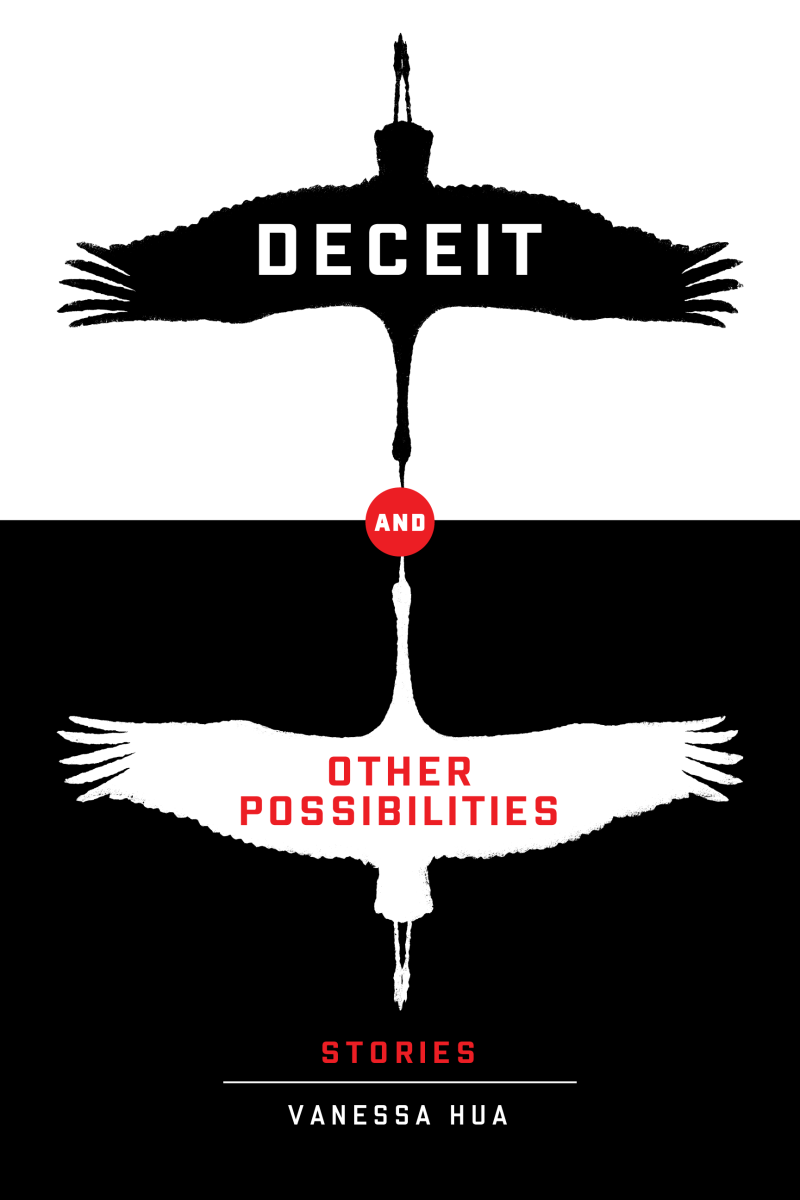
Willow Books, 2016
Reviewed by Jonathan Duckworth
—
“We were chop suey, orange chicken, egg foo yung, Chinese and yet not, American and yet not.” This quote from the collection’s opening story, “Line, Please,” perfectly and succinctly isolates the tension at the heart of the stories in Vanessa Hua’s debut collection, Deceit and Other Possibilities. Be it “Chinese-American,” “Korean-American,” or “Mexican-American,” the stories all put into question what either side of such bifurcation really means and if a person can be both at once.
At first look it’s difficult to draw any kind of general conclusions about the stories in the collection. Most, but not all are set around the Bay Area of California. Most, but not all center on Chinese-American immigrants or the children of such immigrants. However while some of the stories drift from the Bay Area or follow the struggles of immigrants of different extractions, they all contain at the heart of them, as the title suggests, some element of deceit. In the first story, “Line, Please,” Kingsway the rapper’s many sex scandals have leaked and finished off his already floundering career, forcing him to flee back to the Bay Area where he grew up, where he can still hope to escape the truth. In the story that follows, “Loaves and Fishes,” the tables are turned on Kingsway when during a trans-Pacific flight another equally fulsome and equally down-and-out Chinese American rapper, Prophet Alex, performs every confidence trick he can think of in an effort to make a connection with Kingsway, his fellow “fallen man.” The most complicated pattern of deceit emerges in the story “The Older the Ginger” (my personal favorite), where not only has the main character, Old Wu, been deceived by his opportunistic old-country relations looking to marry off their daughters to him, who they wrongly believe to be an American millionaire, but by the later stages of the story he appears to succumb to lure of self-deception, to feel and act like the wealthy American his relations believe him to be.
Stylistically, the collection showcases a number of novel and effective storytelling flourishes. The most notable of these flourishes is what I would call “telescoped time.” On several occasions, such as in “The Responsibility of Deceit,” “Accepted,” and “The Shot,” Hua closes a story with the protagonist having either just done something momentous or disastrous or on the verge of doing it, and then a rapid slideshow of events across a long stretch of time that fully explores the consequences of that action, be it the consequences of coming out as gay to traditional Chinese parents or the legal and familial repercussions of felony arson. One thing that I wished to have seen more of in this collection was the recycling of characters between stories. Hua used Kingsway’s reappearance in “Loaves and Fishes” to great effect, putting a character we already have reason to care about into a new situation. Given how many of the stories are set in the same geographical area within the same immigrant population it wouldn’t have been too great a stretch for more such crossovers. But Hua’s skills as a story-crafter and narrator are showcased better than anywhere in the story “For What They Shared,” the story which more than any other explores the troublesome bifurcation inherent in the immigrant experience. In this story, Hua alternates between two viewpoint characters camping on opposite sides of a road, a Chinese-American who feels out of place in America and who is inexorably drawn by economic and filial circumstances back to China, and an American of Chinese descent who feels disconnected from her native culture. Here Hua manages to craft two characters both wholly-realized and simultaneously hopelessly fragmented, both on intersecting but divergent trajectories.
In parts, the collection reminded me of the best of Jhumpa Lahiri and Robert Olen Butler, but these are only incidental comparisons, and I have full confidence that in time Vanessa Hua will be a writer to whom up-and-coming storytellers are compared. My overall impression of Hua’s debut collection, Deceit and Other Possibilities is that it feels less like a debut and more like the effort of a seasoned and well-established master.
—
Jonathan Louis Duckworth is a current MFA student at Florida International University in Miami, where he works as a teaching assistant. He also serves as a reader and copy-editor for the Gulf Stream Literary Magazine. His work appears in or is set to appear in Sliver of Stone Magazine, Mount Island Magazine,The Kudzu Review, andHermeneutic Chaos Literary Journal.
![[PANK]](http://pankmagazine.com/wp-content/themes/pank/assets/images/pank-logo-large.png)
